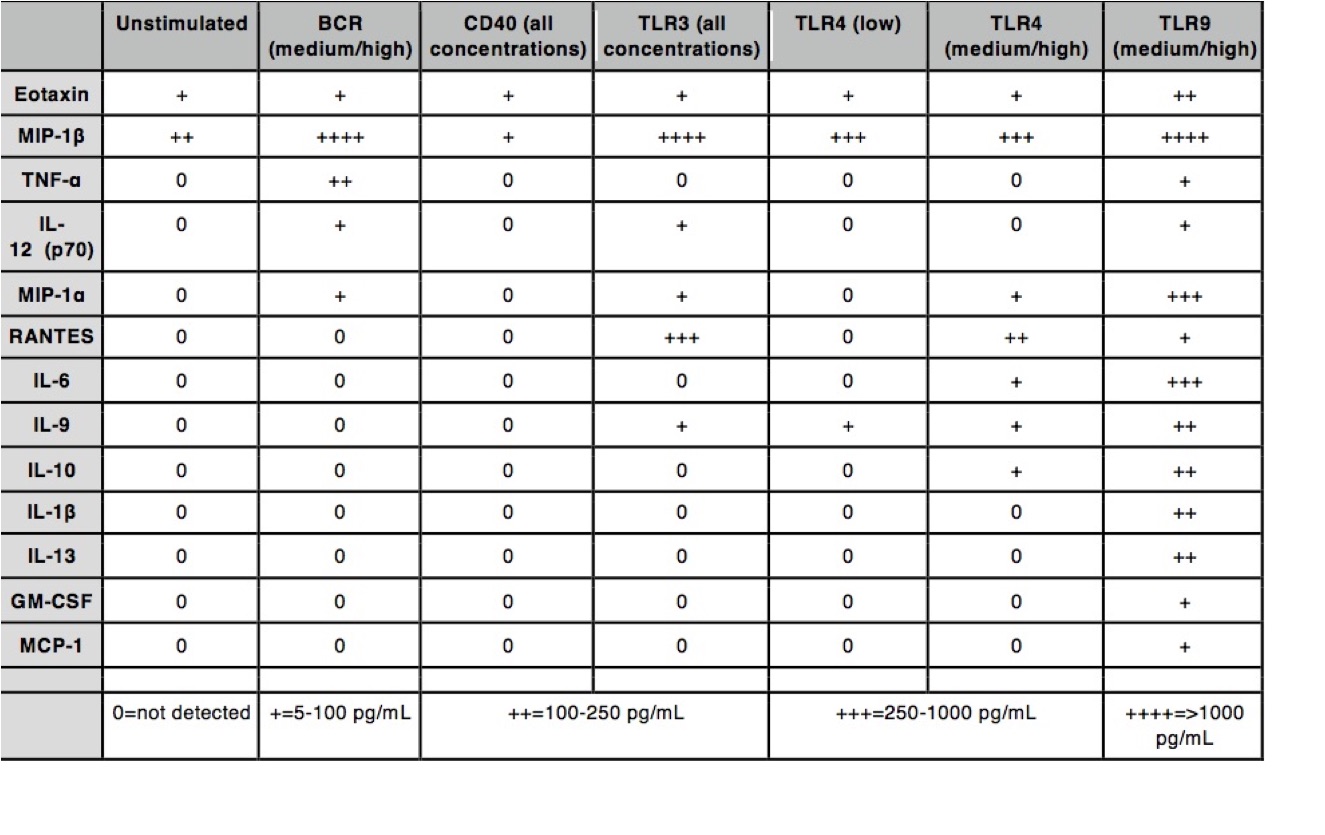Session Information
Date: Monday, November 9, 2015
Title: B cell Biology and Targets in Rheumatolid Arthritis and other Autoimmune Disease Poster
Session Type: ACR Poster Session B
Session Time: 9:00AM-11:00AM
Background/Purpose: B cells contribute to disease pathophysiology through several mechanisms, including cytokine and chemokine secretion. A wide variety of stimuli can activate B cells including B cell receptor (BCR) and Toll-like receptor (TLR) engagement. Recently, numerous observations have demonstrated the requirement of various metabolic pathways in establishing the diverse array of immune cell functions. Here, we examine the metabolic requirements of in vitroB cell cytokine and chemokine secretion.
Methods: B cells were isolated from the spleens of 129 mice using negative selection and magnetic bead separation. B cells were activated overnight individually by the following agents: anti-μ antibody (B cell receptor), anti-CD40 agonist antibody, poly(I:C) (TLR3), LPS (TLR4), and CpG (TLR9). Supernatants were collected and analyzed for the quantification of cytokines using the Bioplex Pro Mouse Cytokine 23-plex assay.Real-time analysis of extracellular acidification rates (ECAR) and oxygen consumption rates (OCR) of activated B cells were performed using the XF-96 Extracellular Flux Analyzer (Seahorse Bioscience).
Results: High-dose LPS and CpG activation of B cells generated the highest levels and widest breadth of cytokines and chemokines (Table 1). In addition, these stimuli generated high OCR and ECAR values, reflecting the need for oxidative phosphorylation and glycolysis respectively. Both LPS and CpG required free fatty acids and glucose as a carbon sources, as addition of etomoxir (inhibitor of fatty acid oxidation) and UK-5099 (inhibitor of pyruvate transfer into the mitochondria) abrogated both cytokine and chemokine secretion and oxidative phosphorylation. The other stimulatory agents tested minimally generated cytokine or chemokine release and did not induce oxidative phosphorylation in B cells.
Conclusion: We catalogued the breadth of cytokines and chemokine secreted by B cells via various stimulatory agents. High-dose LPS and CpG required free fatty acids and glucose for the elaboration of LPS or CpG-induced cytokine production. These data suggest that B cell cytokine and chemokine secretion can be manipulated by altering the local metabolic environment, and may represent an interesting therapeutic approach for modulating B cells in autoimmune diseases.
Table 1. Cytokines secreted by isolated B cells from 129 mice following stimulation.
To cite this abstract in AMA style:
Wu D, Huang D, Pearce E, Kim A. Mouse B Cells Require Glucose and Free Fatty Acids As Carbon Sources for Cytokine and Chemokine Secretion [abstract]. Arthritis Rheumatol. 2015; 67 (suppl 10). https://acrabstracts.org/abstract/mouse-b-cells-require-glucose-and-free-fatty-acids-as-carbon-sources-for-cytokine-and-chemokine-secretion/. Accessed .« Back to 2015 ACR/ARHP Annual Meeting
ACR Meeting Abstracts - https://acrabstracts.org/abstract/mouse-b-cells-require-glucose-and-free-fatty-acids-as-carbon-sources-for-cytokine-and-chemokine-secretion/

